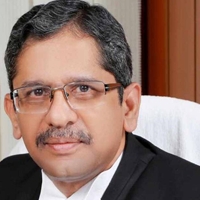N. V. Ramana
Nuthalapati Venkata Ramana is an Indian judge who is serving as the 48th and current Chief Justice of India. Previously, he was a Judge of Supreme Court of India, Chief Justice of Delhi High Court and the acting Chief Justice of Andhra Pradesh High Court.
Nuthalapati Venkata Ramana is an Indian judge who is serving as the 48th and current Chief Justice of India.[1][2][3]
Previously, he was a Judge of Supreme Court of India, Chief Justice of Delhi High Court[4] and the acting Chief Justice of Andhra Pradesh High Court.[5] He has also served as the president of the Andhra Pradesh Judicial Academy.[4]
He was born in a Telugu-speaking agrarian family[6] on 27 August 1957 in Ponnavaram village in Krishna district of Andhra Pradesh.[2] As a student leader he fought for civil liberties during the nationwide The Emergency in 1975 while sacrificing an academic year.[7]
Before joining law Ramana worked as a journalist for the regional Eenadu newspaper for two years.[8] He enrolled as an advocate on February 10, 1983. He has practiced in the High Court of Andhra Pradesh, Central and Andhra Pradesh Administrative Tribunals and the Supreme Court of India in Civil, Criminal, Constitutional, Labour, Service and Election matters. He has specialized in Constitutional, Criminal, Service and Inter-State River laws. He has also functioned as Panel Counsel for various Government Organizations. He has functioned as Additional Standing Counsel for Central Government and Standing Counsel for Railways in the Central Administrative Tribunal at Hyderabad. He has also functioned as Additional Advocate General of Andhra Pradesh.[9] He became the permanent Judge of Andhra Pradesh High court on 27 June 2000. On 2 September 2013, he was made the Chief Justice of the Delhi High Court and on 17 February 2014 he became a judge in the Supreme Court of India. In March 2021, Justice SA Bobde recommended him as his successor to the post of CJI.[3] Ramana was appointed as the 48th CJI by the President of India on 6 April 2021. He took Oath as 48th Chief Justice of India on 24 April 2021. The Oath was Administered by President Ram Nath Kovind at Rashtrapati Bhavan.[2]
As a student leader Justice Ramana fought for civil liberties during Emergency and also lost an academic year. Recounting his experiences of those times, the judge at a book launch event sometime back said he had “no regrets as he had seen many youngsters sacrificing their lives to protect human rights”.
Before he enrolled as an advocate in 1983, Justice Ramana dabbled as a journalist. He worked with Eenadu newspaper from 1979 to 1980 and reported on political and legal matters for the newspaper.
As an advocate he specialised in constitutional, criminal, service, and inter-state river laws at the Andhra Pradesh High Court. Justice Ramana has been part of several landmark judgments, some of which he has authored himself. They reflect his adherence to judicial discipline and the rule of precedent.
Deciding a batch of petitions against internet restrictions in the UT of Jammu and Kashmir, a bench led by him ruled that access to the internet is a fundamental right. It pulled up the government for the telecommunications blackout after the semi-autonomous status of the region was nullified.
He was also part of a bench that brought the CJI’s office under the Right to Information Act. Another bench led by Justice Ramana fast-tracked cases pending against MPs and MLAs, a judgment that was perceived by many as a reason for Reddy’s outrage.
The judge also delivered verdicts in several politically-sensitive cases including the one related to the Karnataka assembly in 2019 where it was clarified that disqualification under the Tenth Schedule (anti-defection law) for defection could not operate as a bar for contesting elections again.
In the case of Maharashtra, the judge had ordered an immediate floor test in the state assembly to prevent horse-trading in 2019.
And in a judgment that put the spotlight on gender inequality when it came to insurance-claim cases, the judge ordered fixing a notional income for non-earning homemakers in such matters.
“The sheer amount of time and effort that is dedicated to household work by individuals, who are more likely to be women than men, is not surprising when one considers the plethora of activities a homemaker undertakes,” he had said in the verdict.

N. V. Ramana
Date of Birth: 27 Aug 1957
Birth Place: Krishna
Proffession: Chief Justice of India
Nationality: Indian


